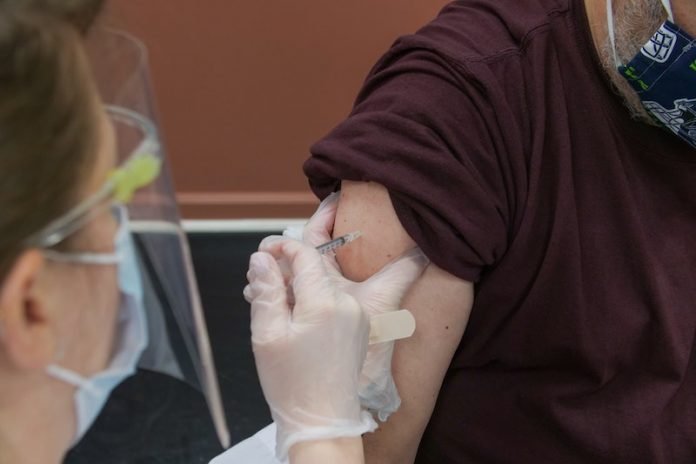
In a new study from King’s College London, researchers found that one in four people experience mild side effects after receiving either the Pfizer or AstraZeneca vaccine, with headache, fatigue and tenderness the most common symptoms.
Most side effects peaked within the first 24 hours following vaccination and usually lasted 1-2 days.
They also found a big decrease in infection rates from 12 to 21 days after the first dose of the Pfizer (58% reduction) and AstraZeneca (39% reduction) vaccines compared to a control group.
The drop in infection at least 21 days after the first dose for Pfizer is 69% and for AstraZeneca 60%.
In the study, the team examined the systematic side effects from the two vaccines currently distributed in the UK, included headache, fatigue, chills and shiver, diarrhea, fever, arthralgia, myalgia, and nausea; whilst local side effects.
They also examined local side effects where the injection took place in the arm, included pain at the site of injection, swelling, tenderness, redness, itch, warmth and swollen armpit glands.
The data comes from 627,383 users who self-reported systemic and local effects within eight days of receiving one or two doses of the Pfizer vaccine or one dose of the AstraZeneca vaccine.
The team found 25.4% of vaccinated people indicated suffering from one or more systemic side effects, whereas 66.2% reported one or more local side effects.
The most-reported systemic side effect was a headache. 7.8% of people reported suffering from headaches after the first Pfizer dose and 13.2% after the second Pfizer dose. 22.8% of people who had the first dose of the AstraZeneca vaccine reported a headache.
The second most reported systemic side effect was fatigue. 8.4% and 14.4% of participants reported fatigue after the first and second dose of the Pfizer vaccine and 21.1% reported fatigue after their first dose of the AstraZeneca vaccine.
The most common local side effect was tenderness: 57.2% and 50.9% after the first and second dose of the Pfizer vaccine, and 49.3% after the first dose of the AstraZeneca vaccine.
Importantly, this research identifies that side effects were more common among people under 55 years of age and among women.
The team says the data should reassure many people that in the real world, after-effects of the vaccine are usually mild and short-lived, especially in the over 50’s who are most at risk of the infection.
The results also show up to 70% protection after 3 weeks following a single dose, which is fantastic news for the country, especially as more people have now had their second jabs.
If you care about the COVID-19 vaccine, please read studies about what heart and stroke patients should know about COVID-19 vaccines and findings of risks vs. benefits of the COVID-19 vaccine you need to know.
For more information about the COVID-19 vaccine and your health, please see recent studies about how the body responds to the COVID-19 vaccine and results showing that how to make COVID vaccines more effective: give people vitamin and mineral supplements.
The study is published in The Lancet Infectious Diseases. One author of the study is Professor Tim Spector OBE.
Copyright © 2021 Knowridge Science Report. All rights reserved.



